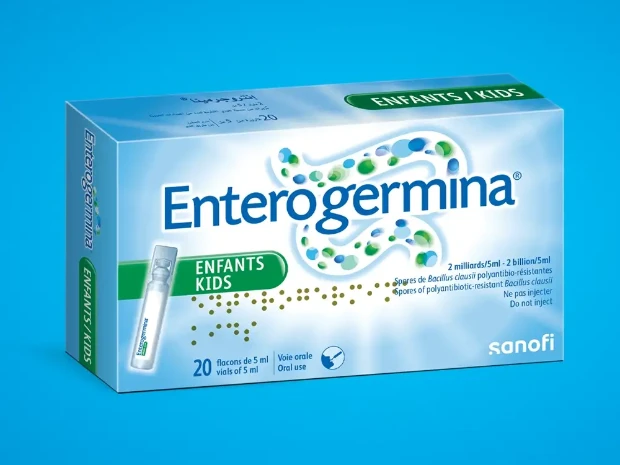5 min Read
If your gut could talk, what do you think it will tell you?
When you don’t know what's going on in your gut, Enterogermina can help you decode what it’s saying. Read on and discover more about gut health and what signs to look out for when your gut is raising a red flag.
Oh, my Gut!
Have you been going in and out of the toilet too often? Are you noticing an acne flare-up or some skin rashes? Have you been feeling sluggish lately? If you are, then listen up. These can all be symptoms of an unhealthy gut1.
What is the Gut?
The gut is also known as the gastrointestinal (GI) tract or digestive tract2. It’s a long tube that starts at the mouth and ends at the anus. The gut is composed of a group of organs that are part of the digestive system like the mouth, esophagus, stomach, pancreas, liver, gallbladder, small intestine, colon (large intestine), and rectum3.
Primary Functions of the Gut4
Digestion
Absorption of nutrients
Excretion of waste
Other Roles of the Gut in the Body
Communication Center5
Studies have shown a brain-gut connection wherein the gut sends information to the brain, and the brain decides what to do with it. Not only do they communicate regarding the digestive process, but they also influence people’s moods, state of mind or stress levels6.

Disease-Fighting System7
The gut also plays a vital role in the body’s immune system by protecting it from illness or infection.
It aids in immune function by sterilizing food with stomach acids and enzymes, triggers hormones and different cell types to help with immune function, monitors the gut lining, generates an immune response when necessary, and produces antibodies to fight allergy-causing substances or antigens.

Home of the Gut Microbiome8
Your gut is home to trillions of bacteria, fungi, viruses, and other microorganisms and is collectively known as the microbiome. There should be a balance between the good and bad bacteria living in your microbe ecosystem or gut flora.
Research findings say that cutting down on unnecessary antibiotics and eating fermented9 food such as yogurt, miso, or kimchi can help maintain this balance. Healthy gut flora is also one of the significant benefits of taking probiotics.

Poor Gut Health Red Flags
If you suspect that you have gut problems, you should watch out for the following red flags:

Autoimmune Problems
Research findings have connected an unhealthy gut to autoimmune diseases10, such as autoimmune liver disease, multiple sclerosis, rheumatoid arthritis, thyroid issues, and Type 1 diabetes.

Chronic Fatigue and Sleep Issues
Difficulty in getting a good night’s sleep and unexplained fatigue or sluggishness may also be caused by poor gut health. Unbalanced gut microbiota can affect the serotonin (a hormone produced in the gut) levels and your body’s circadian rhythm, thus causing sleep disturbances11.

Digestive System Concerns
When you have too many harmful bacteria in your body, it causes dysbiosis12 and may lead to several chronic diseases such as chronic diarrhea, Irritable bowel syndrome (IBS), and obesity13.
Abdominal pain, bloating, constipation, heartburn, indigestion, or food intolerance are all possible gut imbalance symptoms.

Skin Allergies and Rashes
Gut inflammation caused by food allergies or poor diet may "leak" out from the gut. This may lead to skin irritation and cause acne, atopic dermatitis, or psoriasis14.

Sugar Cravings
Increased inflammation in the body has been linked to a diet high in processed food and refined sugars. Added sugars, particularly high-fructose corn syrup, reduce the number of good bacteria in the gut. The imbalance can then lead to sugar cravings and aggravate dysbiosis.15

Unexplained Mood Disorders
Because of the brain-gut connection, your microbiome plays a critical role in your mental health. It affects how you respond to stress and may cause a hormonal imbalance.
Research into the relationship between the enteric nervous system (ENS) and the central nervous system (CNS) has shown profound results. For example, findings show evidence that gastrointestinal irritation can trigger mood changes16.

Unexplained Weight Gain or Loss
When you’ve gained or lost weight without making any changes in your diet or exercise, then it may be a sign of poor gut health. Dysbiosis can impair the absorption of nutrients and the body’s ability to regulate blood sugar and store fat15.
Listen to Your Gut
There's a reason why there’s something that’s called a "gut feel". While your gut cannot literally voice out its concerns, it can tell you about its condition through the various signs mentioned above.
Listen to what your gut tells you. Eating right, getting the right amount of exercise, and taking probiotic supplements can help keep your gut flora in perfect balance.
Browse Our Products
Enterogermina®’s range will scan the gut for intestinal flora imbalance and deliver billions of good bacteria to treat both the condition and associated symptoms. 14
- Gut Pathogens ISOGEM JOurnal. Acne vulgaris, probiotics and the gut-brain-skin axis - back to the future? https://www.ncbi.nlm.nih.gov/pmc/articles/PMC3038963/. Last visited 1 March 2021.
- NYU Langone Health. Your Gut Feeling A Healthier Digestive System Means a Healthier You. https://med.nyu.edu/medicine/gastro/about-us/Gastroenterology-news-archive/your-gut-feeling-healthier-digestive-system-means-healthier. Last visited 12 Feb 2021.
- NYU Langone Health. Your Gut Feeling A Healthier Digestive System Means a Healthier You. https://med.nyu.edu/medicine/gastro/about-us/Gastroenterology-news-archive/your-gut-feeling-healthier-digestive-system-means-healthier. Last visited 12 Feb 2021.
- Patient. The Digestive System. https://patient.info/news-and-features/the-digestive-system. Last visited 12 Feb 2021.
- NYU Langone Health. Your Gut Feeling A Healthier Digestive System Means a Healthier You. https://med.nyu.edu/medicine/gastro/about-us/Gastroenterology-news-archive/your-gut-feeling-healthier-digestive-system-means-healthier. Last visited 12 Feb 2021.
- American Psychological Association. That gut feeling. https://www.apa.org/monitor/2012/09/gut-feeling. Last visited 1 March 2021.
- NYU Langone Health. Your Gut Feeling A Healthier Digestive System Means a Healthier You. https://med.nyu.edu/medicine/gastro/about-us/Gastroenterology-news-archive/your-gut-feeling-healthier-digestive-system-means-healthier. Last visited 12 Feb 2021.
- NYU Langone Health. Your Gut Feeling A Healthier Digestive System Means a Healthier You. https://med.nyu.edu/medicine/gastro/about-us/Gastroenterology-news-archive/your-gut-feeling-healthier-digestive-system-means-healthier. Last visited 12 Feb 2021.
- Biosci Microbiota Food Health Journal. Effects of Diet on Gut Microbiota Profile and the Implications for Health and Disease. https://www.ncbi.nlm.nih.gov/pmc/articles/PMC4034294/. Last visited 12 Feb 2021.
- Cellular & Molecular Immunology. The microbiome and immunity: a paradigm from the gut-liver axis. https://www.nature.com/articles/cmi20187. Last visited 12 Feb 2021.
- Medical News Today. How gut microbes contribute to good sleep. https://www.medicalnewstoday.com/articles/how-gut-microbes-contribute-to-good-sleep. Last visited 12 Feb 2021.
- Cellular & Molecular Immunology. The microbiome and immunity: a paradigm from the gut-liver axis. https://www.nature.com/articles/cmi20187. Last visited 12 Feb 2021.
- NYU Langone Health. Your Gut Feeling A Healthier Digestive System Means a Healthier You. https://med.nyu.edu/medicine/gastro/about-us/Gastroenterology-news-archive/your-gut-feeling-healthier-digestive-system-means-healthier. Last visited 12 Feb 2021.
- Frontiers in Microbiology. The Gut Microbiome as a Major Regulator of the Gut-Skin Axis. https://www.ncbi.nlm.nih.gov/pmc/articles/PMC6048199/. Last visited 12 Feb 2021.
- ScienceDirect. Dysbiosis. https://www.sciencedirect.com/topics/nursing-and-health-professions/dysbiosis. Last visited 1 March 2021.
- The Johns Hopkins Medicine. The Brain-Gut Connection. https://www.hopkinsmedicine.org/health/wellness-and-prevention/the-brain-gut-connection. Last visited 1 March 2021.



.webp/jcr:content/Enterogermina-AE-capsule.webp)